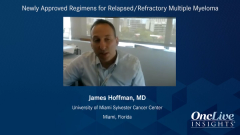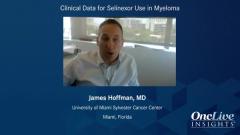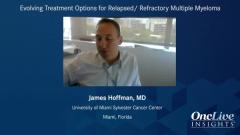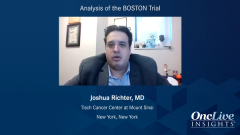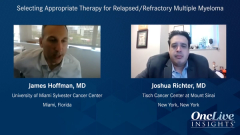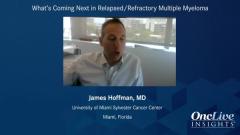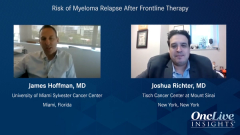
Evolving Treatment Options for Relapsed/Refractory Multiple Myeloma
Drs Hoffman and Richter discuss a promising new treatment for patients with relapsed/refractory multiple myeloma who are not eligible for a clinical trial after 4 lines of therapy.
Episodes in this series

James Hoffman, MD: We’ll see if we agree on this one. We’ve got to find some controversy here, perhaps. I’m always, and I would imagine you’re the same way, we’re seeing lots of patients with myeloma all the time, some of them in circumstances where options are limited. I like having options. I like having the ability to be a little creative with new drugs and trying to get people better despite sometimes tall odds. I’m happy that we have melflufen [melphalan flufenamide] as an option. The challenges for me is we all know that alkylators work, and we use them in the treatment of our patients. This is a drug where, it allows you to use melphalan [flufenamide] in a novel way where you can get higher intracellular levels, specifically intratumoral levels, and at least in a test tube preclinically, get higher cell kill. The challenge for me, at least as it relates to these data, is it’s hard to know how much this adds to alkylators or even drugs like melphalan [flufenamide] itself, which are older and cheaper. It has a place. I’m interested to see as we get more data if this is a more expensive melphalan [flufenamide] that has a cooler mechanism of action, or whether it’s a true advance. I’m curious to hear what you think about all of that.
Joshua Richter, MD: The drug was only approved around 2 months ago, and we only got it on our formulary about a week and a half ago, so I’ve only written [a prescription] for it once. The one big issue with the drug now is that you need a central venous catheter to give it. For the patient, I put a port-a-cath in in anticipation of this drug, and then I explained that if this one doesn’t work, we can use that central access for later. There are ongoing studies. The PORT study is looking to, hopefully by the end of the year, we can start to give this peripherally. I don’t know the answer yet. I am hopeful that the science pans out and this is a better version of melphalan [flufenamide], but I think your skepticism is extremely well founded. We don’t know yet if this is just melphalan [flufenamide] in a new bow, or this is something really different. It needs to get out into the clinic more for us to really see.
James Hoffman, MD: Got it. I know that we’re all very excited about the new world of immunotherapies with CAR Ts [chimeric antigen receptor T-cell therapies] and BiTEs [bispecific T-cell engagers], and a lot of us in the field are hopeful that there’ll be a migration in that direction even earlier in therapy. And we’re all excited to get the first approval this year for commercial CAR T within the myeloma space, after we’ve had commercial approvals in the lymphoma and leukemia space, specifically with ide-cel [idecabtagene vicleucel]. I know that you have active clinical trials up there in this arena. I’m curious to hear your take on how this first commercial approval for CAR T in myeloma is going to impact your management and where you’re going to look to use it.
Joshua Richter, MD: I’m excited about the approval. Because this is a new technology, we haven’t been able to give our first commercial Abecma [idecabtagene vicleucel] treatment just yet. As opposed to a new pill that gets approved, you turn the machines on the day you get approved, you ship the pill, with this there are a lot of inner workings both at the company and internally to make sure cells get shipped in the right way. Hopefully we’ll be getting our first patient on at the end of May, early June. For approval, you must have had at least 4 prior lines [of therapy]. There are a number of patients we have sitting in our clinics right now, you and I probably share a lot of these, who are not eligible for a clinical trial, not for a truly horrible reason, but because of the way trials are written. People who have low grade other malignancies, diagnoses like a stage I breast cancer last year that they were cured from; they’re excluded from trials. They have a creatinine level of 2.5 [mg/dL] and they’re excluded from trials. One of the things that I’m excited about is being able to provide this type of therapy for a patient who is not extremely sick but was otherwise not fitting criteria for trials. It’s going to bring a lot of those patients into the world, and we’re going to learn a lot more from it. What are your thoughts?
James Hoffman, MD: I agree completely. We also haven’t been able to give it, I’m hoping in the not-too-distant future. It’s nice to have a commercial option because as you mentioned there are a lot of hoops to jump through to get patients on clinical trials, and sometimes you miss it by a couple of platelets, and it can be very frustrating. This is going to be a great option. Certainly, you can see some really deep remissions and patients who have been heavily pretreated, and there can be some durability there. I’m hopeful over time we’re going to see even more durability as the CAR Ts evolve and we get some newer options, and perhaps maybe we treat some patients earlier in their disease when the disease is a little more sensitive. But after you’ve been through 4 lines of therapy, we don’t have a lot of one-and-done treatments that can get some deep and somewhat durable benefit. I’m looking forward to being able to prescribe it at UM [University of Miami Sylvester Cancer Center]. I know a lot of patients out there are eagerly looking for CAR T options. It’s been a real hot topic in the clinic for quite some time, and it’s nice that at least we have one that’s going to be prescriptible in short order.
TRANSCRIPT EDITED FOR CLARITY


